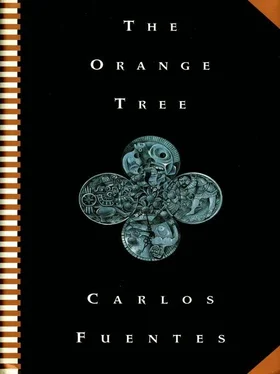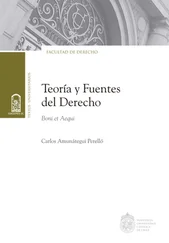Would it rain again, would the maize grow again, the river run, the beasts roar?
All the power, the elegance, the very distance of Moctezuma was the disguise of a man recently arrived at the regions of the dawn. He was a witness to the first shout and the first terror. Fear of being and gratitude for being were mixed within him, behind the paraphernalia of plumed headpieces and collars, handmaidens, tiger knights, and bloody priests.
It was a woman, Marina, an Indian like him, from his own land, who actually defeated him, although she did use two tongues. It was she who revealed to Cortés that the Aztec empire was divided, that the peoples subjugated by Moctezuma hated him and hated each other as well, and that the Spaniards could grasp opportunity by the forelock; it was she who understood the secret uniting our two lands: fratricidal hatred, division — I’ve already said it: two nations, each one dying of the other …
Too late. I communicated to Moctezuma that Cortés was also hated and beset on all sides from an imperial Spain as contentious as the Mexican empire he was conquering.
I forgot two things.
Cortés listened to Marina not only as an interpreter but as a lover. And as translator and lover, she paid attention to the human voices of this land. Moctezuma listened only to the gods; I wasn’t one of them, so the attention he paid me was one more manifestation of his courtesy, as rich as an emerald but as evanescent as the voice of a parrot.
I, who also possessed the two voices, European and American, had been defeated. I had two homelands, which perhaps was more my weakness than my strength. Marina, La Malinche, bore the deep pain and rancor but also the hope of her condition; she had to risk everything to save her life and have descendants. Her weapon was the same as mine: her tongue. But I found myself divided between Spain and the New World. I knew both shores.
Marina didn’t; she could give herself entirely to the New World, not to her subjugated past, true enough, but to her ambiguous, uncertain, and therefore unconquered future. Perhaps I deserved my defeat. I could not save the poor king of my adoptive country, Mexico, by telling him a secret, a truth, an infidelity.
Then came the defeat I’ve already told of.
[5]
Doña Marina and I fought, truly fought, in the drama of Cholula. I didn’t always possess the Mexican language. My initial advantage was knowing Spanish and Maya after the long time I spent among the Indians in Yucatan. Doña Marina — La Malinche — spoke only Maya and Mexican when she was given to Cortés as a slave. So for a while I was the only one who could translate into the language of Castile. The Mayas of the coast told me the things I would translate into Spanish or say them to La Malinche, but she depended on me to communicate them to Cortés. Sometimes, the Mexicans would tell the woman things she would say to me in Maya and I would translate them into Spanish. And although in those instances she had an advantage — she could invent whatever she wanted in passing from Nahuatl to Maya — I went on being the master of language. The Castilian translation that reached the ears of the conquistador was always mine.
Then we reached Cholula, after the vicissitudes of the coast, the founding of Veracruz, the taking of Zempoala and its fat chieftain, who revealed to us, huffing and puffing from his litter, that the conquered peoples would unite with us against Moctezuma. We arrived after our fight against the haughty Tlaxcaltecs, who, even though they were mortal enemies of Moctezuma, did not want to exchange the power of Mexico for the new oppression of the Spaniards.
For centuries, people have said that the Tlaxcaltecs are to blame for everything; pride and betrayal can be faithful companions, each one covering up for the other. The fact is that when we — Cortés and our small band of Spaniards, along with the battalions of fierce Tlaxcaltec warriors — drew up outside the gates of Cholula, we were stopped by the priests of those holy places, because Cholula was the pantheon of all the gods of these lands. As in Rome, they were all admitted, with no distinctions made about their origin, into the great, collective temple of divinities. To that end, the people of Cholula erected the greatest pyramid of all, a honeycomb of seven structures one inside the other, all linked together by deep labyrinths of red and yellow reverberations.
I already knew that in this land everything is governed by the stars, the Sun and Moon, Venus, who is her own precious twin at dawn and dusk, and a calendar that provides a precise account of the agricultural year and its 360 bountiful days plus 5 unlucky days: the masked days.
It must have been on one of those days that we Spaniards arrived here, because after sending the Tlaxcaltec host ahead we ran into a blockade of popes, priests dressed in black — black tunics, black hair, black skin, all as black as the night wolves of these lands, with one single flash emblazoned on their hair, eyes, and togas: the shine of the blood, like a sticky, brilliant sweat, that was proper to their office.
Loud and firmly did these priests speak, forbidding admittance to the violent Tlaxcaltecs. Cortés yielded to their demand, on condition that the Cholulans quickly abandon their idols.
“They haven’t even entered, and they’re already asking us to betray the gods!” exclaimed the popes in a tone difficult to define, between a lament and a challenge, between sigh and fury, between fatality and dissimulation, as if they were ready to die for their divinities, but resigning themselves at the same time to give them up for lost.
All this did La Malinche translate from Mexican into Spanish, while I, Jerónimo de Aguilar, the first of all the interpreters, remained in a kind of limbo, waiting for my turn to translate into Castilian, until I realized, perhaps stupefied by the unbearable stench of muddy blood and incense, shit from Andalusian horses, excessive sweat from the soldiers, conflictive cooking of chili and bacon, of garlic and turkey, all indistinguishable from the sacrificial cooking that wafted its smoke and chanting from the pyramid, I realized that Jerónimo de Aguilar was no longer needed. The diabolical female was translating everything, this bitch of a Marina, this whore who learned to speak Spanish. This scoundrel, this trickster, this expert in sucking, the conquistador’s concubine, had stolen my professional singularity away from me, the function where there was no substitute for me, my — to coin a word — my monopoly over the Castilian language … La Malinche had pulled the Spanish language out of Cortés’s sex, she’d sucked it out of him, she’d castrated him of it without his knowing it, by disguising mutilation as pleasure …
This language was no longer mine alone. Now it belonged to her, and that night I tortured myself in my own sheltered solitude within the clamor of Cholula, whose people had crowded into the streets and onto the terraces to watch us pass with our horses and shotguns and helmets and beards; I tortured myself imagining the nights of love of the man from Estremadura and his whore, her body, hairless and cinnamon-hued, with the excitable nipples these women use to attack and the secret and deep sex they hide, sparse in hair, abundant in juices, between their wide hips. I imagined the incomparable smoothness of the thighs of Indian women, used to having water flow over them to wash away the crusts of time, the past, and the pain that clot between the legs of our Spanish mothers. Female smoothness, I imagined her in my solitude, hidden holes in which my lord Hernán Cortés has poked his fingers, tongue, phallus, his fingers adorned with festive rings and wrapped in gauntlets when time came for war: the hands of the conquistador, between jewels and steel, metal nails, fingertips of blood, and lines of fire — luck, love, intelligence in flames, guiding toward the perfumed medlar of the Indian woman first his sex sheathed in a pubic beard which must be as ascetic as the vegetation of Estremadura, and a pair of balls which I imagine tense, as hard as the shot of our harquebuses.
Читать дальше












